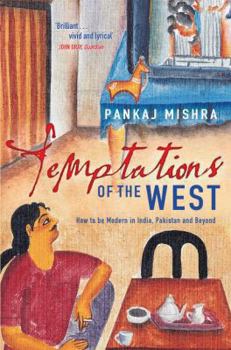Temptations of the West: How to Be Modern in India and Beyond
Select Format
Select Condition 
Book Overview
A New York Times Book Review Editors' Choice In Temptations of the West, Pankaj Mishra brings literary authority and political insight to bear on journeys through South Asia, and considers the... This description may be from another edition of this product.
Format:Paperback
Language:English
ISBN:0330434683
ISBN13:9780330434683
Release Date:January 2007
Publisher:Picador USA
Length:438 Pages
Customer Reviews
5 ratings
lively and in depth reportage
Published by Thriftbooks.com User , 16 years ago
This travelogue/reportage is extremely well written with very deep analysis of the social forces that rule these places of geopolitical importance. Mishra has invoked the history in brief for each place to explain why the society there is turning the events in some particular way. He also explains how the hegemonic powers are causing tension in the lives of the people living there. However the title is a total misnomer, and does not convey the true value of this book. This book does not give a list of "what to do's" if you travel those places. It reports what the author saw happening in those places, tried to get interviews of some key players and explains the socio-historic background of the regions.
Worth reading, its an eye-opener
Published by Thriftbooks.com User , 16 years ago
Pankaj Mishra writes like he is having a long and detailed conversation with you. After spending a few weeks reading this book, I feel that he is a close member of my social circle. He is a true journalist - he does not preach, he allows you to draw your own conclusions. His facts will knock your socks off. This is stuff we never hear in our world of Fox News.
Insight into a little known part of the world
Published by Thriftbooks.com User , 17 years ago
In this book of essays, travel reports, and opinions, I'm not quite sure just what the word 'Modern' means in the sub-title. The places he visits and upon which he reports don't seem to fit my definition of 'modern.' India is, of course, a world of contrasts, just as is the rest of the world. The places he describes in this book are a long way from the high-tech world you talk to whenever you have a problem with your computer. It's much the same as comparing the fishermen in South Louisiana with down town Manhattan. Here we see India (and surrounding countries) as a place of dirt streets, mud houses, and a collection of hatreds between tribes and religions that go back centuries. At the same time, he reports on some progress as a middle class begins to emerge, but also a religious militancy with inter religious warfare. The pull of the material aspects of the west are matched by nationalism. Mostly I come away from this book knowing that I know less about that part of the world than I thought. That I will probably never have a good understanding, and a feeling of some dispair in looking towards the future.
The Journalist in the Back Alleys
Published by Thriftbooks.com User , 17 years ago
The problem with journalistic sketches such as these is that they are forever becoming obsolete. Since many of these essays take the reader only to 2004, one is left wondering, for instance, what is happening today in Bollywood, with India's BJP party, in Kashmir, in Musharref's Pakistan, and in Nepal and Tibet. Events in these parts of the world are moving faster than Mishra can write about them. But the great value added here is Mishra's untangling of the tortured web of historical events and personalities from which India, Kashmir, and Pakistan stumbled their painful way into their current predicaments. Often one is left trembling with despair. For instance, Mishra gives us a detailed retelling of the decades of ubiquitous injustices and murders rampant in Kashmir. And the deeply solidified hatreds and passions that have emerged from the power-hungry ambitions of men throughout the 19th and 20th centuries, from the British on, leave one feeling hopeless for any reasonable resolution to the India/Pakistan Muslim/Western miasma engulfing us today. Indeed, one wonders at the subtitle of this book, "How To Be Modern in India, Pakistan, Tibet, and Beyond." It seems to be something of an ironic joke, since Mishra is never at a loss to point out the hypocrisy of corrupt Indian "modern" politicians who live in a self-imposed bubble and ignore the suffering of millions. He also gives us an insider's look at Bollywood's lightweight "modern" movie stars and movie makers whose financial backing comes from criminals. And in general he sees the cup here as definitely more than half empty. Perhaps that viewpoint is from his many interviews at the ground level, with the suffering masses, the pathetic, powerless victims, and the poverty-stricken illiterate. I recommend this book for those naive Westerners, like Thomas J. Friedman, who think "shining India" is the focal point of the modern world. Not quite.
Riveting, important reporting on South Asia
Published by Thriftbooks.com User , 17 years ago
I loved The End of Suffering, Mishra's previous book, which looked at the progress of the historical Buddha in northern India 2500 years ago. Mishra effectively intertwined autobiographical details with that story, and he does the same, to powerful effect, in this closely observed look at nationalism, extremism and modernity in India, Pakistan, Tibet and Afghanistan. Mishra conveys what it feels like to be a citizen of the countries he visits, whether it's the aspiration and anxiety of movie industry hangers-on in Bombay or the bleak outlook of a family in the crossfire of Afghanistan. This book is at the standard of the best non-fiction by VS Naipaul, though I find Mishra's take on Hindu nationalism to be more accurate than the Nobel laureate's.





